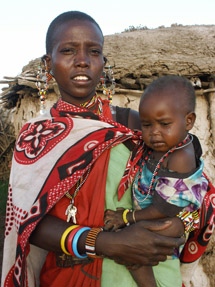How do you reach the most isolated people in the most remote places on the planet with the Good News of Jesus Christ? Sanford, Florida based New Tribes Mission (NTM) identifies new tribes around the world and makes it their mission to reach them with the gospel.
NTM is one of the largest missionary organizations in the world with 3,300 missionaries deployed around the globe. The name New Tribes Mission was chosen in 1942 by Paul Flemming, the organization’s founder. Flemming had been a missionary and noticed that tremendous effort was put into getting the gospel to people living in heavily populated cities, but there was a lack of focus on reaching those living in outlying areas; generations of people living their entire lives without ever hearing the Name of Jesus.
“When you think about it,” said Nita Zelenak, spokesperson for New Tribes Mission, “what tribe is new? Our focus is on people groups that have had either no or limited access to the gospel. They’re isolated because of their location or they’re isolated because of their language. They are groups that would be isolated even if they had a radio because the message that came over their radios would not be in their language.” That’s how NTM determines the groups they work with. They are limited by location and/or language. There is no gospel witness in their language. These groups often have enough language to trade with other groups – that is, they use terms for commerce, but they don’t have the ability to converse about spiritual concepts in their own language. What’s being communicated on a spiritual level can’t be understood because the language simply does not exist.
NTM missionaries are linguistically trained to skillfully infuse gospel related terms into the new language. Working through translators doesn’t always work. “When you’re working through a translator,” says Zelenak, “you’re depending on whether he’s getting it right, and if he’s not you don’t always know it. That’s why learning the language and learning the culture is such a high priority.”
“We used to pack all the information into you before you went to the field,” says Zelenak, “but there’s one thing about learning a language: it’s all theory.” Learning language in a safe and sterile classroom environment is vastly different than being dropped into an unfamiliar culture to speak an obscure language to survive while bringing the gospel to the most isolated people in the world. 
“Once missionaries are established among their tribal groups, consultants are sent to help them at their current level. Once they get more proficient, we send consultants to help with church planting, teaching and translation,” says Zelenak.
Purity of language is the highest priority for NTM. The task is crucial; syncretism is a clear and present danger. “People take what they understand and mix it with a tribal belief system and they end up with a third religion that is not Christianity,” Zelenak says.
NTM missionaries are no strangers to danger or persecution. In 2005, Hugo Chavez, president of Venezuela, expelled NTM missionaries from the country. He accused them of collaborating with the CIA and for violating the country’s laws and sovereignty. Indigenous people that NTM worked with in Venezuela protested against the expulsion saying, “Poverty remains acute among many Indian communities and many protesters said the missionaries were the only people who have tangibly improved their lives,” according to a 2005 MSNBC report.
In 1993, members of the FARC guerilla group abducted three NTM missionaries in Panama and brought them to Colombia where they were killed. In 2001, Martin and Gracia Burnham were abducted in the Philippines while away on holiday celebrating their anniversary. In 2002, during a rescue attempt launched by Filipino government troops, Martin Burnham was killed and Gracia was shot in the leg. Their story made headlines around the world and is the subject of the book In the Presence of My Enemies, written by Gracia Burnham and Dean Merrill. “The story of Gracia Burnham has really raised the level of visibility and interest in our organization,” says Zelenak.
An investigation completed by G.R.A.C.E. (Godly Response To Abuse In The Christian Environment) in August 2010, has also raised the level of NTM’s visibility. During the late 80’s and throughout the 90’s, allegations of sexual abuse at a Fandango, Senegal boarding school began to surface. NTM operated the school for the children of missionaries. As allegations began to surface, NTM began to investigate the claims internally. “One of our errors was doing an in-house investigation,” Zelenak said. NTM contracted with G.R.A.C.E. to conduct an outside investigation for increased credibility and accountability. NTM is currently working through recommendations made by G.R.A.C.E.
 NTM has put in place a number of policies to safe guard and protect the safety of children that come in contact with the organization. “There is a heightened awareness within the organization that you can’t go to sleep on the job,” Zelenak said. “You have to be vigilant about the possibility of child abuse and protect against it.” NTM’s high profile has caused Christian organizations around the world to stand up and take notice of what is happening in their own organizations and to put in place safeguards to protect against the possibility of child abuse.
NTM has put in place a number of policies to safe guard and protect the safety of children that come in contact with the organization. “There is a heightened awareness within the organization that you can’t go to sleep on the job,” Zelenak said. “You have to be vigilant about the possibility of child abuse and protect against it.” NTM’s high profile has caused Christian organizations around the world to stand up and take notice of what is happening in their own organizations and to put in place safeguards to protect against the possibility of child abuse.
As NTM has worked to reach out and respond, abuse survivors have felt free to speak out about the far reaching effects of the mistreatment. For many years NTM has asked that abuse be reported and offers to provide funding for counseling for abuse survivors. More have stepped forward to report past abuse and to receive help since the report. “That is good,” Zelenak said. “Some survivors have told us that it has been a healing experience to have their voices heard publicly.”
The report has raised the awareness of the possibility of child abuse in Christian organizations and the need for safeguards and policies to protect children. For the last 15 years NTM has been seeking to raise such awareness. They have put together a training series on “Abuse, The Hidden Secret” and made it available, along with our other materials, to the general public. NTM worked with over 30 missions and church affiliated agencies to found the Child Safety and Protection Network, a group committed to a set of “Best Practice Standards” for child protection. NTM has also incorporated special child protection training into missionary candidate training.
“Learning about current child protection policies and safeguards has relieved the concerns of some who had not heard what is being done now to provide safe, nurturing environments for children within NTM,” Zelenak said. “But nothing we have done to raise awareness of the need for child protection policies has had the far reaching effect that the public report of abuse that happened at our school in Africa has had.”

Comments